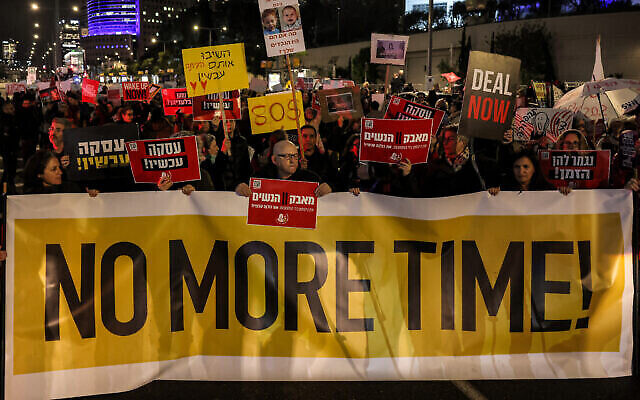At least 32 of the 136 hostages held in Gaza killed, 20 others feared dead – NYT
IDF spokesman says bodies of 31 captives held by Hamas, including soldiers Oron Shaul and Hadar Goldin who fell in 2014, Hostages and Missing Families Forum concurs.

(THE TIMES OF ISRAEL) Thirty-two of the more than 130 hostages still held captive by Hamas are no longer alive, according to a report on the eve of the fourth month of the war between Israel and the Gaza terror group that provided an updated picture of the status of the hostages.
Citing a confidential assessment conducted by Israeli intelligence officials, The New York Times reported on Tuesday that more hostages have been killed than previously thought — until now, the IDF had only confirmed the deaths of 29 of the captives still in Gaza.
In addition to the 32 confirmed deaths, the IDF is assessing “unconfirmed intelligence” that at least 20 additional hostages may have also been killed, the report said, quoting four military officials who spoke on condition of anonymity.
The families of the deceased have all been informed of their deaths, the officials said, and confirmed that the majority of the dead were killed during the deadly Hamas terror onslaught on October 7 and their bodies were taken to Gaza.
In response to the report, IDF Spokesman Rear Adm. Daniel Hagari said that the IDF is “working in all ways to return [the hostages] home, and exhausting all information about them and their conditions.”
“The IDF is accompanying the families of the hostages in these complex and difficult days, and our representatives are providing the families with any confirmed information on their loved ones,” he said during an evening press conference.
He said that the IDF has so far notified the families of 31 hostages that their loved ones are confirmed to have been killed.
They include 29 hostages kidnapped by terrorists on October 7 — all of which have been announced over the past months — and soldiers Oron Shaul and Hadar Goldin, who were killed and their bodies were abducted by Hamas in 2014.
“To the rest of the families, we provided the accurate information about their fates and conditions,” he said.
Similarly, the Hostages and Missing Families Forum said that it was told by the IDF ahead of the article’s publication that 31 of the hostages, not 32, had died.
“According to the official data we have, there are 31 victims,” the Forum said in a statement. “Before the article was released, an official message was given to all the families of the abductees by the liaison officers that there is no change in the situation assessment.”

Of the 253 hostages seized when thousands of Hamas terrorists slaughtered some 1,200 people across more than 20 communities in southern Israel on October 7, it is believed that 132 are still in captivity after a weeklong truce in late November saw the release of 105 people.
Four hostages were released prior to the truce and troops rescued one other. The bodies of eight hostages have also been recovered and three others were mistakenly killed by the military.
Hamas is also holding two Israeli civilians, Avera Mengistu and Hisham al-Sayed, who are both thought to be alive after entering the Strip of their own accord in 2014 and 2015 respectively, and the bodies of Shaul and Goldin.
Tuesday’s report came amid ongoing efforts by negotiating parties to secure the release of the remaining hostages and a new temporary truce in the fighting in Gaza, through which Israel has vowed to eliminate Hamas and end its 16-year rule of the Palestinian enclave.

In recent days, Hamas officials have been examining a proposed deal that was drawn up in a meeting between US, Egyptian, Israeli and Qatari officials in Paris on January 28.
The exact details of the proposed deal are unknown. According to some reports, it offers the possibility of a six-week pause in fighting in Gaza for the first time since late November, and the release of all hostages still held there.
Other reports, however, have said the framework provides for the release of only 35 hostages — women, the elderly and the sick — during a 35-day initial truce, with the potential for another week’s pause in fighting during which negotiations could be held on further releases. Still more reports have cited differing terms in the unconfirmed framework deal.
While negotiating parties have said that they are optimistic about the deal coming to fruition, they have cautioned that there is still a ways to go.
Key elements of the deal are said to have not been finalized, and a central sticking point remains unresolved: While Hamas has said it will not sign onto any deal unless Israel commits to a withdrawal and permanent end to the war, Prime Minister Benjamin Netanyahu has vowed not to pull troops out until “total victory” has been achieved — which he defines as largely eradicating Hamas.
Along with Hamas’s demand that the truce lead to a more permanent ceasefire, the issue of the Palestinian prisoners is expected to be one of the main areas of disagreement, as Netanyahu has stressed over the last week that Israel is not prepared to “release thousands of terrorists” in exchange for the hostages.

comments